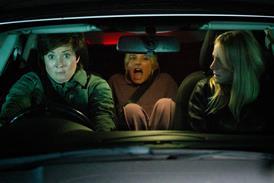Krishnan Guru-Murthy has claimed that diversity in UK broadcasting has gone “backwards” over the past 20 years because bosses are “paralysed by the idea of doing something really radical”.
The Channel 4 News presenter was speaking at City University’s Women on Air conference, where he announced that the Expert Women monitoring campaign, which is run by the university and supported by Broadcast, will be extended into a new monthly study, titled Diversity Watch.
Guru-Murthy said monitoring of how “visible ethnic minorities” are being involved in current affairs discussions will help improve diversity in UK news. He hopes it will be a stepping stone to tackle employment issues in the industry.
“The Broadcast Expert Women campaign had a big impact on our newsroom. We talked about this every day, and still do. We have discussions about our casting all the time,” he said. “The thing about equality is that it applies to everybody, and we must apply the same logic, methodology and determination to every aspect of equality.”
Guru-Murthy argued that he has not seen any “significant improvement on diversity” in his 26 years in broadcasting and that the “gently-does-it” approach had “failed to deliver” change.
The notion of positive discrimination should be embraced, he added, to break down the “unchallenged quota of white, middleclass, middle-aged men”.
“The broadcasting landscape has been socially engineered for decades. How else did we end up with a bizarrely unrepresentative population?” the newsreader asked, adding: “Our ambition should be to reflect the nation we serve. If you want to call that a target, call it a target.”
Guru-Murthy also took aim at the BBC. He claimed that when he worked on Newsnight in the late 1990s there were three ethnic minority reporters, and now there are none. “I don’t see how that is progress,” he said, adding that the notion that Mishal Husain has “transformed the diversity” of the Today programme “doesn’t cut it”.
Broadcast and City University’s Diversity Watch will launch this autumn, with post-graduate City University journalism students counting how many black, Asian and minority ethnic (BAME) experts appear on services including BBC News, Sky News and C4 News. The results will be published every month.
The study will be limited to TV initially, with the students counting ‘visible’ BAME experts. Guidelines for collecting the data are likely to be established by an independent steering group, which will be put together later this year.
Guru-Murthy was speaking as City University revealed the collated results of the Expert Women campaign over the past two years. It showed that male experts outnumbered their female counterparts by four to one. It also revealed that for every three male reporters, there was only one female correspondent.
Newsroom reaction
BBC head of newsroom Mary Hockaday said the figures were “very troubling”, while C4 News deputy editor Shaminder Nahal found them “depressing”.
Sky News head of home news Sarah Whitehead said improved relationship building and more robust contact lists of expert women would make a difference. “If people know who you are, they will be more comfortable about coming in. It also helps when you’re clear about what they’re coming on to discuss,” she said.
ITV News managing editor Robin Elias suggested that a greater number of female decisionmakers would contribute to getting more women on air. “We need to target the people making the decisions [about booking guests] and give them the time to really think [about expanding their list of experts],” he added.
EXPERT WOMEN: JOWELL’S CALL TO ARMS
Dame Tessa Jowell has issued a call to arms to bolster support for the Expert Women campaign after labelling the research into the issue as “devastating.”
The Labour MP told the Women on Air conference that the “stakes are high” and urged more people to support the initiative. “There is an obligation for all of us to stand together and make absolutely clear that we are expressing a huge tidal wave of opinion,” she said. “It should never be a lone person campaigning, but a chorus of voices.”
She acknowledged that some gains had been made, pointing to broadcasters signing Broadcast’s Expert Women pledge, but said much work still needs to be done.
“This remains a huge issue – the media is a prism through which so much of life is interpreted,” she said. “Gender imbalance is a major challenge to impartiality and ultimately impacts the long-term effectiveness of our society.”

























No comments yet